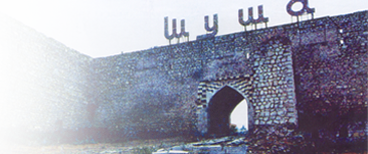 ACTUAL QUOTE
ACTUAL QUOTE
Ekmeleddin IHSANOGLU,
Secretary-General of Organization of Islamic Cooperation:
“The Organization of Islamic Cooperation doesn’t recognize so-called “presidential elections” held in the occupied Nagorno-Karabakh. The Organization continues to support the peaceful and fair settlement of the conflict between Armenia and Azerbaijan on the basis of principles of unity, territorial integrity and inviolability of recognized borders at international level”.
From the statement posted on the official website of the OIC, July 19, 2012
Ahmet DAVUTOGLU,
Turkish Foreign Minister:
“Armenia-Azerbaijan, Nagorno-Karabakh conflict is an obstacle standing in the way of stability in the South Caucasus. Liberation of Nagorno-Karabakh and the other occupied territories of Azerbaijan remains main direction of our foreign policy and after this we will work in this direction. We strongly protest the occupation of Azerbaijan’s 20% territories and forcibly exiling of our Azerbaijani brothers from their lands. We are seriously concerned about unsuccessful negotiations, which have been continuing for 20 years. It will be difficult to achieve peace, stability and tranquility in the South Caucasus and Middle East unless the Nagorno-Karabakh conflict will be settled peacefully within the territorial integrity of Azerbaijan”.
From the speech at the meeting of the Council of Foreign Ministers within the Summit of Cooperation Council of Turkic Speaking States in Bishkek, August 23, 2012
Igor POPOV, Robert BRADTKE and Jacques FAURE,
OSCE Minsk Group co-chairs:
“The co-chairs acknowledge the need for the de facto authorities in NK to try to organize democratically the public life of their population with such a procedure. That procedure of July 19 in no way prejudges the final legal status of Nagorno-Karabakh or the outcome of the ongoing negotiations to bring a lasting and peaceful settlement to the Nagorno-Karabakh conflict”.
From the statement of co-chairs, July 20, 2012
Georgian MFA:
“Georgia does not recognize the so-called “presidential elections” in Nagorno-Karabakh. The Georgian government has once again clearly expressed support for the independence and territorial integrity of Azerbaijan”.
From the statement of Georgian MFA, Tbilisi, July 20, 2012
Seyyid Abbas ERAQCHI,
Iranian Deputy Foreign Minister:
“The Islamic Republic of Iran attaches great importance to the Azerbaijani-Iranian relations and to respect the independence, sovereignty and territorial integrity of Azerbaijan and recognizes Armenia as an aggressor”.
From the statement during the visit in Baku, August 24, 2012
Alexander LUKASHEVICH,
special representative of the MFA of Russia:
“Russia doesn’t recognize the independence of Nagorno-Karabakh. Russia believes that the “elections” held in Nagorno-Karabakh will not influence the negotiations on the settlement of the Nagorno-Karabakh conflict”.
From the answer to the question of APA’s correspondent, Moscow, July 20, 2012
Armenians about Armenians
Robert ARAKELOV
KARABAKH DIARY
(beginning in the previous issues)
TECHNOLOGY OF NATIONALISTIC CONFUSION
At the last days of July of 1923 there was organized gathering of commissions for preparation of the Resolution about NKAP. The Resolution which was adopted in 1923 for provincial executive commissars was taken as the base. Although the autonomy of the region was created for Armenian population, at the gathering there was adopted decision about joining numerous Turkish villages of Karabakh to its structure. Even the commission adopted a resolution about subordination of Shusha city and Khonashen to plain Karabakh. But A. Karakozov insisted that Shusha city and Khonashen village must be kept in the structure of Nagorno-Karabakh. This view of Karakozov could gain votes of six Azerbaijani leader workers together with the chairman of the commission.
At the same gathering there was adopted decision about the form of controlling and administrative share of plain Karabakh and Kurdistan.
A year after, on 5 June, 1924 at the gathering of commission over solution of border problems between Aghdam region and NKAP there was decided that Khonashen lands, especially lands of Kuropatkino village would be kept under control of NKAP according to order of ACEC of 6 August, 1923. The Avshars were allowed in 1924 to rep the harvest from their sowing. Then E. Khanbudagov, I. Dovlatov and M. J. Bagirov were sent to Karabakh according to decision of Presidium of CC ACP of 20 August and the secretariat of CC of 5 September for investigation of situation in Nagorno-Karabakh and holding some works. They were also commissioned to investigate attentively the conflict among habitants of Muslim village Kolani and Armenian village Sarov. The results of the mission were discussed on 8 October at the gathering of the Presidium. It was decided to charge Natcomagr (National Committee of Agriculture – red.) with giving free forest materials to Nagorno-Karabakh; Sovnatcom was charged with raising the problem about increasing the quotes of rice to Nagorno-Karabakh instead of the mentioned free support, to speed up giving of needed resources for building of electro-station in Khankendi and immediately looking through the problems related with using terms of lands; Natcom of health was charged with opening agricultural point in Khankendi. Besides, Karabakh committee and provincial revolutionary committee were suggested to follow the borders of Kurdistan province in Galaderesi region with the aim of including Kurd villages to Kurdistan province. The last problem was lightened at report of M. J. Bagirov, which was written according to official journey. Bagirov informed in CC that all ten thousand population of Shusha city wished to join Kurdistan province. Bagirov suggested that Shusha city could be joined to Kurdistan province then be the provincial center. M. J. Bagirov considered transfer of Shusha to the structure of Nagorno-Karabakh as a big mistake. He wrote: “In Khankendi, Shusha and Abdalar regions there are many Muslim villages: Khalfali, Zaristi, Musulmanlar and others with 8000 population and it is easier to control them from Abdalar than Khankendi, because among these Muslim villages there is Karaderesi village with 1150 Armenian habitants. The whole region was joined to Khankendi causelessly”.
(to be continued)

